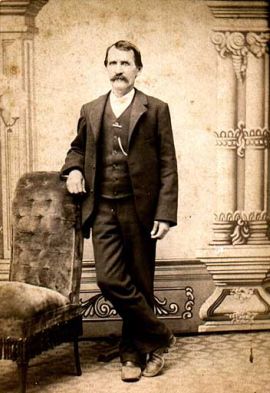James Skidmore, born on April 12, 1830 in Hardy County, West Virginia, today enlists in the Fifty-First Illinois. Though a relatively young 31 years of age, Skidmore’s life to this point has been filled with sorrow. He married Rebecca C. McBee in Hardy County in 1852. In 1856 the couple moved, with their three children, to Middlefork Township, Illinois. Less than a year later, Rebecca died, leaving James to care for their children. Two years later, James married Martha Hornbeck, the ceremony taking place in the Gospel Baptist Church in Vermilion County, Illinois. Tragedy, however, struck again, as Martha died in 1861.
Thus, when James joins the 51st Illinois and as a private in Captain John McWilliams Company E, he does so as a double widower. He also chooses the path opposite of his brother, who, having settled in the South, is fighting in the Confederate Army. James serves in the Union Army throughout the war, his service interspersed with a gunshot wound in his left arm at Chickamauga and subsequent (and unrelated) periods of serious illnesses. In April 1865, mere days before Confederate General Robert E. Lee surrenders and the war is effectively over, James is promoted to first lieutenant and put in command of Company F. Tragedy, however, strikes yet again, as at the time of his promotion, James’ father dies in West Virginia.
Shortly after the war ends, James marries a third time, to Margaret J Ward (born in New York in 1840) on September 7, 1865. In 1874, James and Margaret leave Illinois and move to Cherokee County, Kansas. There, they farm and ranch, and James becomes a Justice of the Peace and a dealer of farm implements.
A Baptist since his twenties, in Kansas James becomes a deacon in the local Baptist church. He outlives Margaret, passing away at the age of 96 on May 8, 1924, the oldest resident of Columbus, Kansas at that time. His obituary reads in part:
He was a good soldier, a brave and efficient officer and a 100 percent loyal American.
He was ever ready to and never failed to render assistance to those less fortunate physically or financially. He was a consistent Christian, being for about seventy years of his life an active member of the Baptist Church. He possessed a cheerful disposition and for many of the last years of his life he was, to his delight, known as and called “Uncle Jimmy.”
On the day prior to his departure he was informed that he had about reached the end of his life, and he replied: “Very well. I have lived a clean life. I have kept the faith and am ready for the final call.” He was conscious up to within a few hours of his death. He left a rich inheritance by the Christian fortitude he displayed through life and in the hour of death. “Uncle Jimmy” will be greatly missed not only by his immediate family, but the friends he left who are legion.
James Skidmore represents many northern Baptist men who serve in the Union army, survive and live long afterward, and serve as Baptist laymen in their local Baptist congregations. Their service to the United States celebrated by family, friends and regiment comrades, the active faith of Baptist laymen and Civil War veterans such as Skidmore is often viewed by survivors outside of the congregation as complementary to service for country.
Source: “James Skidmore, Sergeant, Company E, Lieutenant, Company F” (link)



